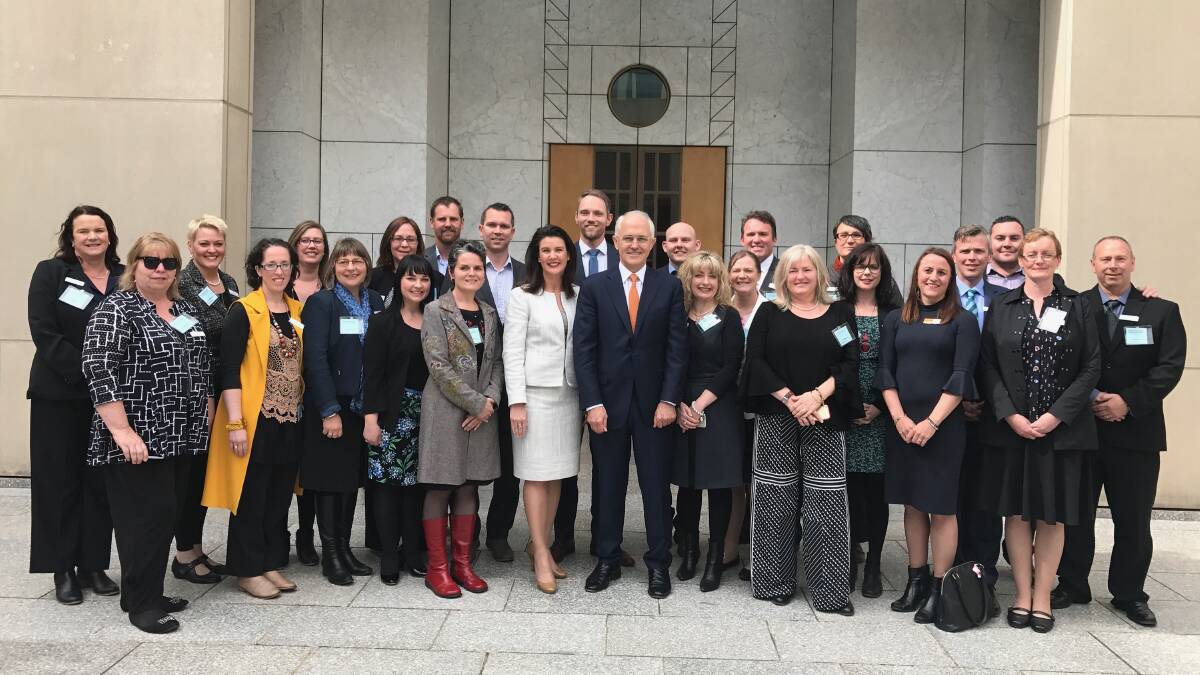
When speaking to the new graduates of Leadership Ballarat and Western Region’s annual development program, there is a common theme: their differences brought them closer together.
Subscribe now for unlimited access.
or signup to continue reading
“It started at our opening retreat where we had an opportunity to tell our own stories,” aboriginal affairs advocate Jon Kanoa said.
“It was amazing to learn about all of the different people from different backgrounds and upbringings. We really dug into some of the things you don’t necessarily talk about with people you first meet. Learning more about each other was the key in holding us together as a group.”
Jennie Courtney, who became LBWR chief executive in September following the resignation of Sofia Fiusco, said the Leaders Forum was designed to challenge, develop and ultimately inspire emerging leaders in a way that would drive collaboration and development across the region.
One of the key elements in doing this was the community-based learning opportunities, where participants explored issues by coming face to face with the people directly impacted.
Group discussions and personal reflections followed, with the emerging leaders asking questions they had never considered before and challenging their long-held views.
For Janelle Burns, who is an executive assistant to CEO at Sovereign Hill and has lived in Ballarat her whole life, these sessions were eye opening
“I sit behind my desk within my own bubble and don’t get exposure to all the issues we face in Ballarat,” Ms Burns said.
“One of the days that stuck in my mind was the day we visited Yuille Park primary school and seeing the people who live in underprivileged areas and the issues they’re facing.
“Another day we went to Narmbool and had a look at the bushfire affected areas and just the way the community has been so resilient and banded together to get through that devastation.”
It was these two same experiences that stood out for City of Ballarat road safety supervisor Alan Jones.
“Being involved in local government you see one perspective in the community,” he said. “(The program) made us look at things through a different light and perspective, and you learn how passionate people are about certain issues.”
Ash Sims, a strategic sourcing manager at Mars Chocolate Australia, said a visit to Langi Kal Kal Prison was a memory that would stay with him.
“It challenged my views of jail and the perception that everyone is bad, there are stories of people who have been hard done by,” he said. “But it was not a comfortable experience.”
Artist Tas Wansbrough had a similar response.
“To talk to offenders in a prison in a forum where they were quite honest with us about their expectations for release and life after release, it gave us an opportunity to think about all kinds of really tricky issues that came up, and I don’t think we solved them,” Ms Wansbrough said.
Psychologist Shannon Thompson has been exposed to community health and welfare issues throughout her career. She said seeing some of her teammates’ surprised and emotional responses made her realise she took this knowledge for granted.
For her, the more eye opening sessions were around infrastructure, government planning and industry, which included a visit to Central Highlands Water and a council meeting.
“We underestimate all the work that goes on behind the scenes and unfortunately there are a lot of armchair critics,” she said.
Mr Kanoa, who is executive officer for the Grampians Regional Aboriginal Justice Advisory Committee, said while the program allowed him to learn about things outside his own realm of aboriginal affairs, it was also an opportunity to educate others.
Having grown up in Western Victoria as part of the Gunditjmara people and worked in aboriginal affairs his entire career, he was able to have open discussions about racism with fellow emerging leaders.
“It was something I could bring to the conversation and say ‘look I’m not just here as a token aboriginal person’,” Mr Kanoa said. “What I want to do is be able to create some more awareness around aboriginal history and culture.”
One of his highlights was a trip to Canberra in October. Ms Wansbrough agreed.
“Advice from politicians about personal resilience was hugely beneficial to me,” Ms Wansbrough said.
“Having the ability to speak to people who have had long careers in leadership and to have unvetted open question time with them and their generosity with their answers was a really wonderful experience.
“Whichever side of the fence you sit on politically, when you meet the politicians in person you get overwhelmed by your respect for how hard they work and how dedicated they are to their jobs.”
The 23 graduates leave the program with more connectedness to the region, knowledge of things outside their expertise and confidence to step up both within the workplace and community.
They will now join almost 300 alumni in the Leaders in Action group, where they will have further opportunity to engage in initiatives, network and collaborate on projects.
And this year’s group is already eager to make a difference together.
“With a diverse group, you get more out of it because there are more kinds of views so it just brings the best out of everybody,” Mr Jones said. “There has already been discussion on how we can move forward together and identify projects we can work on together.”
The 2016 program graduates are:
Wendy Adams, Jacinta Baxter, Lloyd Bennett, Sarah Birtles, Janelle Burns, Lindy Crowe, Keren Day, Philip Diprose, Talina Edwards, Anna Harber, Shane Herbertson, Alan Jones, Jon Kanoa, Jacqueline Keevins, Jacqueline King, Daina MacLeod, Kimberley O’Neill, James Rendell, Ash Sims, Donna Stanczak, Shannon Thompson, Kane Vorbach and Tas Wansbrough.













